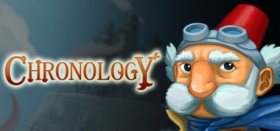
Chronology Review
Less is more, as the saying goes. Osao Games’ Chronology is an indie puzzle-platformer that wants to adhere to the the age-old quip, but doesn’t quite reach its goals - this is a very short (and kind of sweet), little journey that has clearly been lovingly crafted, but suffers from some technical issues and lack of depth.
Waking up in a dystopian world, your professor protagonist has coincidentally lost his entire short-term memory, only starting to piece together fragments of his psyche after finding his pocket watch that can also warp time itself between two separate states. This is Chronology’s main mechanic, and also what places it apart from the plethora of other indie platformers out there. With the tap of a button, the Professor can switch between the current dystopian world he’s found himself in, or the utopian one he belonged to before his Mentor (no real name given), betrayed him and started conducting experiments - leading to the city’s decline.

Switching between these two states frequently is what you’ll need to do in order to progress, and while most of the time-based puzzles are predictable, they’re still satisfying enough to solve and conquer. The consequences your actions have in one time period by changing something in the other is what makes Chronology enticing though. One section asks you to feed some weird, sentient and gelatinous blob some mushrooms. Placing one in its food bowl and changing time will see the blob fully grown either outwards or upwards depending on which fungi you placed in its food bowl.
You’ll also be joined by Snail (presumably the only only one left in existence) after getting to grips with your time-travelling abilities. The mollusk carries on its back a metallic shell that can freeze time, adding an extra layer of challenge to the puzzles you’ll face as the Professor. One section towards the end tasks you with firing a cannon, freezing the shot mid-air, setting it alight, and then re-firing it at a wall.
But it’s all over so fast. By the time you get comfortable with using the Professor and Snail’s abilities in tandem (both characters can be controlled by toggling between them), the game is already over. Within three hours, you’ll see the end credits roll, and while Chronology is satisfying to play, you’ll be left with a bittersweet feeling when it’s over, because the replayability of the Professor’s adventure is almost nil.

You can go through a second time, but the motivation just isn’t there when you already know the solution to every hurdle. There’s also some issues with frame rate and screen tearing, especially while transitioning between different areas. They don’t make the game unplayable by any means, but they can be very intrusive at times. It’s a shame too, because Chronology is a pretty game. The pastel colour palette and lively animations when you switch between time periods are great.
Chronology is an enjoyable indie game, but it’s held back by some poor pacing issues and a general lack of technical polish. If you’re a fan of games like LIMBO or Bastion, you’ll no doubt enjoy it.
Chronology (Reviewed on Windows)
Game is enjoyable, outweighing the issues there may be.
Chronology is an enjoyable indie game, but it’s held back by some poor pacing issues and a general lack of technical polish. If you’re a fan of games like LIMBO or Bastion, you’ll no doubt enjoy it.








COMMENTS